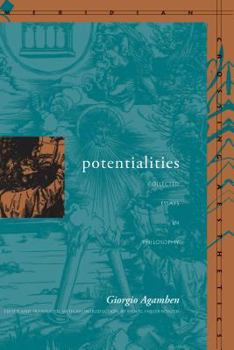Potentialities: Collected Essays
Select Format
Select Condition 
Book Overview
This volume constitutes the largest collection of writings by the Italian philosopher Giorgio Agamben hitherto published in any language. With one exception, the fifteen essays, which reflect the wide range of the author's interests, appear in English for the first time. The essays consider figures in the history of philosophy (such as Plato, Plotinus, Spinoza, and Hegel) and twentieth-century thought (most notably Walter Benjamin, but also...
Format:Hardcover
Language:English
ISBN:0804732779
ISBN13:9780804732772
Release Date:January 2000
Publisher:Stanford University Press
Length:328 Pages
Dimensions:1.1" x 6.0" x 9.0"
Customer Reviews
3 ratings
Potentialities and not Potential
Published by Thriftbooks.com User , 15 years ago
This is one of the most significant collections of Agamben's writings on philosophy. Covering a wide ranging topics from the almost phenomenological opening "The Thing Itself" to Benjamin, Warburg, Hegel and Heidegger, the essays outline in different ways a fundamental and decisive break between metaphysical and post-metaphysical thinking. The chapter on Deleuze "Absolute Immanence" is especially profound as it sets out to explain Deleuze's idea of "life" in the context of other thinkers such as Kant, Spinoza, Husserl and Heidegger. This short chapter merits a detailed study and interpretation as it represents one of the most succinct and penetrating thought into the heart of Deleuze's philosophy of life. There are potentialities, not just one potential for each being (Aristotle).
On the Existence of Non-Being and more
Published by Thriftbooks.com User , 23 years ago
This is a collection of essays written over a period of twenty years. This book is as stunning in its unexpected insights as it is diffcult to summarize. Agamben's mastery of classical philosophy and philology gives him the advantage of discussing pressingly modern issues in philosophy, history, politics and criticism as personified in the works of everyone from Aristotle to Heidegger, Benjamin, and Derrida. And that advantage is apparent not only in the ease with which he brings Aristotle's discussion of dynamis (potentiality) on the issue of redemption and Being, but also in the vividness of ancient philosophy's immediate relevance to the discussion of the messianic notion of time and history as transmitted to our age through figures such as Kafka, Benjamin and Scholem.This collection of essays is divided into three parts: Language, History, Potentiality. Each section has under it a number of essays loosely pertaining to that category. Under the section on Histroy, for example, we have essays on Aby Warburg and the man's legacy in the refiguration of the study of art history; on Tradition; on Hegel's Absolute and Heiddeger's Ereignis; on Walter Benjamin's Angel of History; and on Benjamin's rumination on the Messiah in realtion to the Sovereign.Heiddeger looms, as always, over much of Agamben's writing, but here so does that which has no name except as a tradition that partakes of the kabbalistic power of deep vision. The content of the book is offered here like so many spores of light, shedding light on so much of what constitutes the abyss/ground of modernity, but resisting capture in the stiff net of unimaginative academic argumentativeness. The prose is as dense as usual, reflecting the very density of the topics the author is trying to analyse. A most head-on collision of a reading.
Potenzia is the name of a Hyundai
Published by Thriftbooks.com User , 24 years ago
Potentialities, or more precisely, potentia passiva. Reception and capability go together: the hand is the gift that gives itself (handshake) and receives: catch! The chapter on Heidegger and Stimmung is for me the most interesting. The word "facticity" is confusing because it implies making (factum est verum), but is the very opposite of any making (ie, thrownness). Agamben traces in the word the common root of both fetish and faktish, and finds in the notion of Stimmung a weise, a face, or guise. There too is a passivity, and the passivity of "affect" as both reception and potential (the ability to receive: endexetai). Heidegger would perhaps find there xeir-, or hand: VorHANDenheit and ZuHANDenheit). Aisthesis as both an activity (-is) and a passivity (think of all the plays on the word horen in S & Z). The introduction by the translator is curious. As for the distinction of intentio prima and intentio secunda, it is the very basis of modern science and Descartes' geometry: not this conic section (intentio prima) but every conic section (intentio secunda taken as intentio prima). That is the origin of Husserl's "sedimentation," and hence the return to the "things themselves." In sum, much can be learned from this book.





